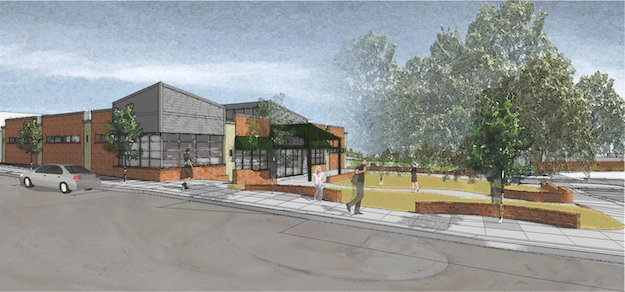COOPERATIVE GROCERY STORE TO OPEN IN DURHAM

Image: Durham Co-op Market
Durham’s already thriving food scene will soon add a grocery co-op, with shelves stocked full of locally grown and produced goods. When the Durham Co-op Market (formerly known as Durham Central Market) opens its doors in early 2015, it will be the realization of a dream that began more than half a decade ago.
Thanks to the work of the Board of Directors, over 1000 community owners and a partnership with Self-Help Ventures, the market was able to sign a long-term lease on a property near the Chapel Hill Street exit of the Durham Freeway last year. Construction is now well underway, and is expected to finish sometime early next year. At the end of May the market hired its first paid employee when the Board selected Leila Wolfrum to serve as general manager.
Not Your Parents’ Grocery Co-op
The new market will be right down the street from Durham’s previous grocery cooperative, the Durham Food Co-op (aka People’s Intergalactic Food Conspiracy). The Durham Food Co-op closed its retail operation in early 2009 after struggling for years to bring in enough revenue to cover its operating expenses.
Although many people involved with the Durham Food Co-op have helped support the new effort, the Durham Co-op market is a very different kind of cooperative. The new co-op will be a full service grocery store, and will include a hot bar as well as a place to enjoy a meal or conversations with friends, much like Weaver St. and Chatham Marketplace. Wolfrum is no stranger to this type of store, having served as the operations manager at Company Shop Market, Burlington’s grocery co-op, since its beginning in 2011.
Keep it Local Ya’ll
Unlike a traditional for-profit grocery store, where a small group of often non-local investors determine how the business is run, the people who shop and work at Durham Co-op Market have complete control over the store’s policies. “Because we’re cooperatively owned, our owner base and our customer base are the same. Although we have the economic imperative of running a successful store, we can also incorporate all of the other values that our owners bring to the table,” Wolfrum explains. It is up to the owners to determine “where our food comes from, what products we sell in the store, how we do our hiring and how we relate to our neighborhood.” Anyone can purchase an ownership share online.
The store strives to become an anchor in Durham’s local economy. Durham and the surrounding area have become a hot-bed of new food ventures, like Big Spoon Roasters and Locopops. Often start-up enterprises begin selling out of a cart or at weekly markets. The Durham Co-op Market will offer local food businesses much needed shelf-space in a full-service grocery store, allowing customers to purchase locally produced goods without making additional shopping trips.
The co-op’s support for the local economy goes beyond the products on the shelves. “We’ll be focused on doing our hiring locally and drawing our staff from the immediate neighborhood,” says Wolfrum. “We’ll also be using local contractors and buying from local vendors to try and get as much of the money that comes into the co-op back into the local community.”
The full-service grocery store does provide an alternative to locally-owned specialty stores like Rose’s Meats and Sweets and Pine State Flowers, but Wolfrum is not too worried about competing. “The growth of the sustainable food economy in Durham is good for everyone involved. The more people who start thinking about where their food comes from and the values that went into it, the better.” Durham is expected to experience enormous growth in the next few years, and Wolfrum wants to be sure that this growing demand is met with a locally-sourced supply.
An Alternative to Business as Usual
Although cooperatives have been around since the 1840’s, they’ve experienced a major rise in popularity in the US ever since the 2008 financial crisis. Supporters believe that cooperatives can help democratize the economy and allow larger segments of the population to have an ownership stake in society. Seeing the potential of cooperative businesses to strengthen local economies, some city and state officials have begun writing policies to encourage their development. A recent industry survey estimates that there are now 29,284 cooperatives in the US, with total revenue equalling $653 billion per year. Last spring, Yes! magazine dedicated an entire issue to the state of the cooperative movement in America.
Cooperatives often have trouble competing with the advantages of scale that big corporations enjoy but, in some sectors, networks of locally-controlled cooperatives are finding ways to stay competitive. Durham Co-op Market recently joined the National Cooperative Grocers Association, a meta-cooperative consisting of 142 food co-ops from all across the country, including Weaver St. and Chatham Marketplace. This membership allows the Durham Co-op to enjoy competitive pricing and share the organizations knowledge base, while retaining local autonomy.
Although grocery co-ops are the most common type of co-op in North Carolina, cooperative businesses have begun in other sectors as well. Opportunity Threads is a worker-owned cut and sew company based in Morganton, and Durham-based Bountiful Backyards is a landscaping co-op. Anyone interested in starting a co-op or converting an existing business into a co-op in NC can contact Carolina Common Enterprise.
Successful cooperatives prove that another way of doing business is possible and profitable. Allowing a community’s values to temper the pursuit of profits and distributing ownership across diverse populations, the cooperative principles point towards the possibility of a new, socially and ecologically responsible economy.
The Durham Co-op will open its doors to customers early next year.
- Categories:


